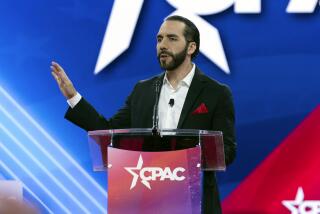Obama shakes Cuban leader Raul Castro’s hand: What it means
President Obama’s appearance at the Soweto memorial for Nelson Mandela provided a conflict in word and deed: a none-too-subtle upbraiding of nations like Cuba and a seemingly friendly handshake with the country’s leader, Raul Castro.
And if the handshake between presidents has no lasting impact, it will also put something of a lie to two long-held — and in one case demonstrably erroneous — assertions about politics: that pictures always trump words, and that any gesture of comity with Cuba will backfire in the electorally key state of Florida.
The first axiom was most famously recounted by “60 Minutes” correspondent Lesley Stahl when she covered the Reagan White House in the 1980s. After what she considered a hard-hitting piece on Reagan, she was congratulated by a White House official who said he’d loved it. Why? Because its patriotic images had drowned out her criticism. “Nobody heard what you said. Nobody heard you,” she later quoted him as saying.
And the converse — negative images doing the drowning — has also been true. Besides his staff, can anyone remember Michael Dukakis’ defense policy in the 1988 campaign, or if he even had one? All that lingers is the Democratic candidate in a tank, a helmet perched Snoopy-like atop his head, the image that haunted him for the rest of the failed campaign.
So historically, Obama’s words might stand to be overwhelmed by the picture of him greeting Fidel Castro’s brother with a smile. Not that his words weren’t bracing, particularly given a setting that demanded a certain deference to a country that, along with others not on the U.S.’ list of favorites, had long supported Mandela’s cause.
“Around the world today, men and women are still imprisoned for their political beliefs, and are still persecuted for what they look like, and how they worship, and who they love. That is happening today,” Obama said to applause.
“And so we, too, must act on behalf of justice. We, too, must act on behalf of peace. There are too many people who happily embrace Madiba’s legacy of racial reconciliation but passionately resist even modest reforms that would challenge chronic poverty and growing inequality. There are too many leaders who claim solidarity with Madiba’s struggle for freedom but do not tolerate dissent from their own people.”
Helping the words overwhelm the picture, for once, are the changing views about Cuba itself. Reflexive anger at the nation’s leaders that once would have been visited on an American president delivering a handshake is dying out along with the Bay of Pigs generation.
Cuban Americans, a key electoral audience in Florida, historically allied themselves with Republicans because of the party’s anti-communism tenets. But younger Cubans are breaking away. In 2012, according to an analysis of exit polls by the Pew Hispanic Center, Obama narrowly defeated Republican Mitt Romney among Cuban American voters in Florida, 49% to 47%.
True, Romney’s showing was almost double his paltry standing among Latinos nationally, but the results spoke to a generational shift. Obama campaign manager Jim Messina declared it “a dramatic realignment in that state.”
UC Riverside professor Benjamin Bishin, who has studied the Cuban electorate in the state’s most populous county, Miami-Dade, found that support for restrictions imposed on Cuba at the behest of the older generation has been fading, as is the affinity for Republicans.
“The community is moderating very slowly,” Bishin told The Times last year.
White House officials cautioned against giving great meaning to the handshake Tuesday; the president, one said, was focused only on honoring Mandela.
Still, the fact that it occurred was a reminder that truisms don’t always remain true in a country being altered daily by tides of age, race and ethnicity. That is something that Obama, the first black American president, in South Africa to honor a man once considered a terrorist and now revered worldwide, must have already known.
Twitter: @cathleendecker
More to Read
Sign up for Essential California
The most important California stories and recommendations in your inbox every morning.
You may occasionally receive promotional content from the Los Angeles Times.











